Violence against students: A tribute to our little John Hampdens
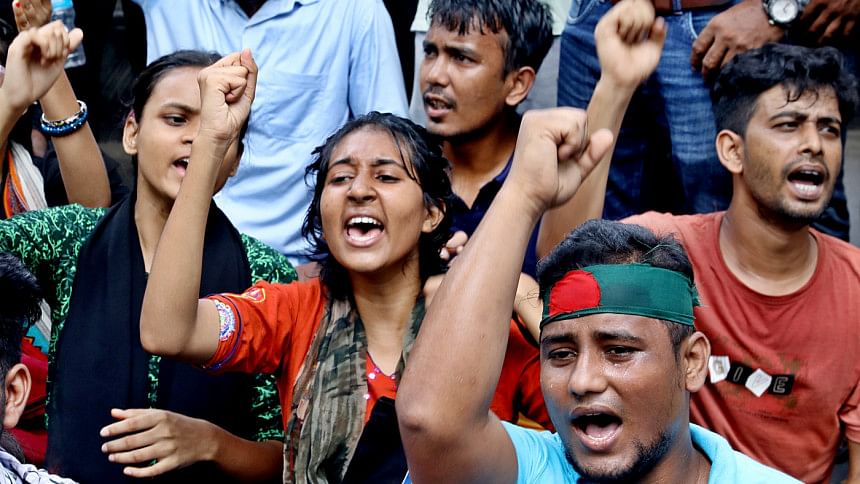
On July 23, 2024, a police officer kicked a teenager named Muhammad Fahir and mistreated an adult at UK's Manchester airport. The incident caused shock and horror in British society and around the world and provoked protests in Greater Manchester. The police officer involved has been suspended and is under investigation.
Remarkably, around the same time, law enforcers—who are paid by our money—killed in broad daylight hundreds of unarmed protesters, mostly students, in the streets of our beloved Bangladesh. According to a July 26, 2024 report in the Prothom Alo, at least 204 people were killed during this spate of violence alone. Since there is an alleged attempt to suppress the records of the carnage, we may not know the true number of casualties. Perhaps, such massive shootings and killings in the streets of Bangladesh are unprecedented.
While many protesting students are succumbing to injuries, hundreds of them are lying in excruciating pain in hospitals with various degrees of bullet wounds. Fearing arrest by the police, many more chose not to receive treatment in hospitals and are suffering in silence. Many are staying under self-imposed house arrest to avoid police harassment in the streets. As Bangladesh is a country of roughly 170 million people, here we are talking about the ordeals of millions of students.
Is there no responsibility for all these killings, injuries, and sufferings? No compassion for the tears of bereaved parents who had pinned so much hope on their now-murdered children?
Many in Bangladesh seem to have been processing the tragedy of the mass slaughter of students in dead silence. But what does it tell us about our status as human beings and about the value of our lives as Bangladeshis? I am talking about the lives of all Bangladeshis irrespective of their political complexion or partisan preferences. I repeat: here I am concerned with the lives of all Bangladeshis, including those who murdered our students in the streets.
Gruesome and unbearable shoot-to-kill images have continued to emerge. What transpires through a cursory look at social media sites is that students have been killed and maimed like birds. These students have parents and siblings; they are sons and daughters of Bangladesh society and are the future of the country. Attacks on them are attacks on the entire population.
As regards the Manchester airport incident, race was most probably an important factor that incited the violent behaviour of the police officer concerned. But why did our law enforcers kill our young people in such large numbers? It's not race hatred or political differences that have snatched away so many precious lives from us. It is the reduced value of our lives that made this possible.
Our lives are cheap. When we degrade and mistreat each other, we do so at our own peril. The oppressor and the oppressed among us all are lesser human beings. This realisation and efforts to address it will mark the beginning of our collective healing.
The normalisation of government-sponsored violence points to the sad truth that our lives are cheap. Bangladeshis can be harassed and killed, and the perpetrators face no consequences. Only a select few at the top of the government enjoy Brahmanical privileges, while the rest are pawns or hostages in an undemocratic system.
Students who were shot dead and injured were simply exercising their democratic rights and posed no threat to anybody. What took them to the streets tells volumes about present-day Bangladesh.
The phrase "the tip of the iceberg" is perhaps overused. But it serves to emphasise the magnitude of specific problems. The quota issue is only on the surface and only the tip of the iceberg. There are long, under-the-surface stories that have to be told to explain what gave the students such courage and brought them face-to-face with violence from law enforcement and ruling party men. They have defied the fear of death. On this issue, Bangladesh seems to have been in a war between two camps: the law enforcers and ruling party people on one side, and the general students on the other.
Meritorious students of underprivileged backgrounds from rural areas study at public universities with much hope and aspiration for a better life. Those who have graduated in the last couple of decades or are currently studying at Bangladesh's universities, mostly the public ones, are cognisant of the suffering to which they have been vulnerable at the hands of so-called student leaders (known as "cadres" in campus parlance). The way ordinary students are mistreated at many of Bangladesh's universities may reveal a pattern reminiscent of the master-slave relationship.
We do not discuss it enough, but we know what happens especially in the campus and dormitories at most universities in Bangladesh. You may not find many Bangladeshi university students/graduates who have not experienced or heard of the beatings of ordinary students by the "cadres" at universities. What is more, sexual harassment of female students at universities is common knowledge in present-day Bangladesh.
University students in Bangladesh have been enduring all forms of mistreatment; many had hoped that upon graduation they would get government jobs. The quota system hammered the last nail in the coffin of that aspiration for a better future. Seeing no other options, like Thomas Gray's "village-Hampden … with dauntless breast," students in Bangladesh are rising up against tyranny in their land. In a climate of cowardice and sycophancy, their exemplary courage and bravery and their faith in themselves and one another have given Bangladesh a renewed patriotism and a glowing confidence in the country's future.
The government has been trying to contain students through bullets, blood and poison gas, but the number of John Hampdens is perhaps too many for it to suppress. Meanwhile, forces beyond our control have continued to whittle down our country to its bones.
Md Mahmudul Hasan, PhD, is professor in the Department of English Language and Literature, International Islamic University Malaysia. He can be reached at [email protected]
Views expressed in this article are the author's own.
Follow The Daily Star Opinion on Facebook for the latest opinions, commentaries and analyses by experts and professionals. To contribute your article or letter to The Daily Star Opinion, see our guidelines for submission.

 For all latest news, follow The Daily Star's Google News channel.
For all latest news, follow The Daily Star's Google News channel. 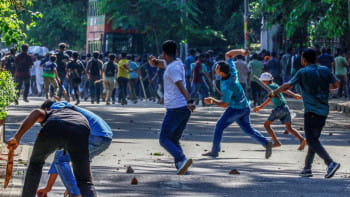
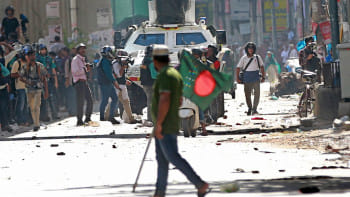


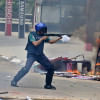
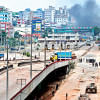





Comments